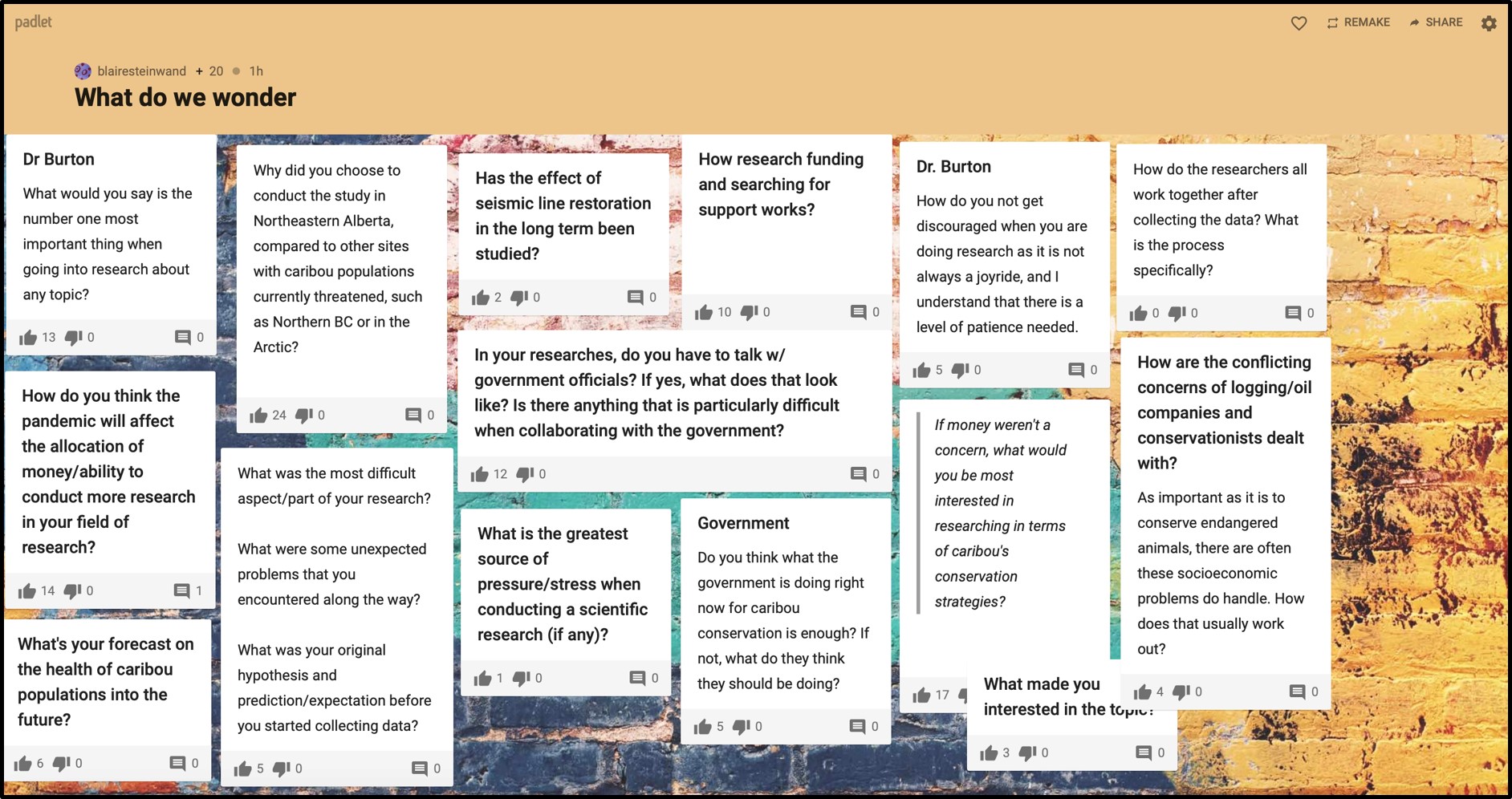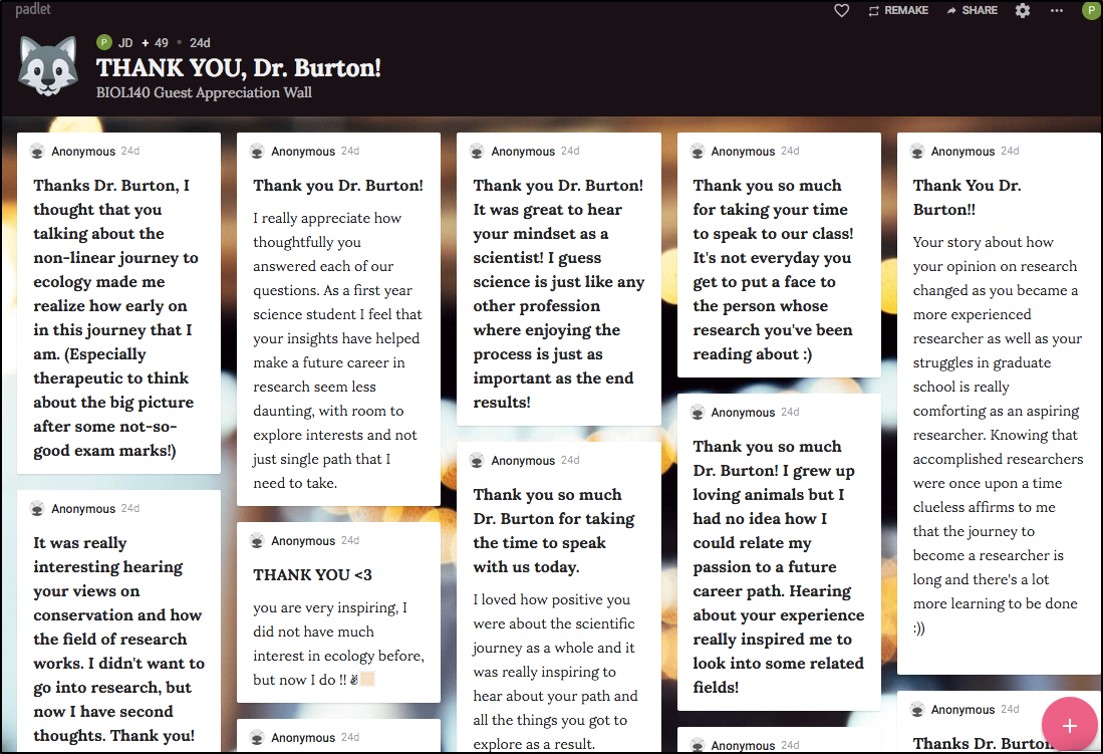Blaire Steinwand and Jaclyn Dee recently teamed up to bring in Dr. Cole Burton as a guest speaker in their BIOL 140 course. Students had previously read popular press article pieces about Dr. Burton’s research on caribou conservation, and this session gave them an opportunity to meet and learn more about him and his work.
Ahead of the session, students were tasked to develop questions to ask Dr. Burton. To facilitate this, Jaclyn and Blaire set up a Padlet where students could post and up-vote questions. The questions that received the most votes were selected, and the students who originally posted these questions in the Padlet were asked to ask them during the session (see questions Padlet below).

“It was so much fun,” said Blaire about the session, “and students thought it was really cool to talk to a real scientist who worked on the literature they’d been reading.”
Keep reading to learn more about Blaire and Jaclyn’s experience with hosting a guest speaker in their BIOL 140 class, what it brought to the course, and what they learned along the way.
Why did you decide to include a guest speaker in your course this term?
One of the big picture goals of BIOL 140 is to have students see scientists as real people. By bringing Cole into the classroom, students were able to meet a scientist they had just read about.
We also want students to see scientists as approachable. Students commonly ask “How do I approach a professor? How do I talk to them?” This activity served as an ice-breaker for talking to professors, so in the future when they’re applying for an NSERC or trying to work in someone’s lab, they can hopefully draw on this experience of talking to a professor.
Finally, we were covering a topic that we’re not experts in – we’re not caribou biologists – and we wanted students to be able to connect with an actual researcher and author in this field.
What did the guest speaker bring to your course?
With a guest speaker, it’s great to hear about their science, but what’s even more impactful for students is to hear about their journey as a scientist. There’s a special connection that’s built when students can hear a scientist tell their own story and bring their research to life.
How did students respond to the guest speaker?
The students were thrilled. He was kind of like a celebrity to them. For one student in particular, you could just see it on her face how happy and excited she was to talk to Cole and have that learning opportunity. In the feedback, students shared that they learned a lot about what the path of research looks like.
Also, our students have been very clear with us that they’re mostly interested in molecular biology and have asked why we’re so focused on this ecology topic. During the session Cole told them that he actually started off interested in molecular biology and that his research took him in different directions. The students were surprised to hear this because they think that if you’re a pre-med you’re just interested in molecular biology and you can’t be interested in ecology. He gave them a perspective that they may not have already heard or thought about.
What did you take away from this experience?
It was fun and engaging to hear Cole’s personal story, and we learned a lot about conservation, policy and science. Even if it’s someone in your field, there’s always something to learn when talking to another scientist, whether it be about their personal story or their research.
What did you find most surprising about this experience?
The students asked really excellent questions and they spanned many different directions – his personal journey, career, research, funding, how his work has changed over time, his interactions with the government and policy, and how his research interacts with First Nations. The process of giving students time to think, having them write the questions, and then having them up-vote likely helped produce questions of such high quality.
We were also surprised by how engaged the students were. Many students kept their cameras on and they would ask follow-up questions. We had a few students send us private chats asking if they could ask another question at the end if there was time.
What advice would you give others who are interested in including a guest speaker in their course next term?
- Choose guest speakers carefully – We had a great experience with Cole, but not everyone may be the best guest. We recommend that you choose someone who you think will interact well with students.
- Reach out to potential guest speakers sooner rather than later – For scheduling reasons it helps to reach out at least a month in advance. Try to be flexible and offer different possible dates so that you can fit the guest speaker into a timeslot that works for them.
- Centre the session around student questions – This will ensure that the session is focused on what the students want to hear instead of just what the guest speaker wants to say. Allow students to up-vote possible questions so that you can get a sense of what they are most curious about.
- Get students used to asking questions early in the course – We were having students ask questions in every class, so by the time it got to the point of creating questions for Dr. Burton, they were already very much in the mode of asking questions.
- Allow enough time for students to post and up-vote questions – We made the Padlet available a week before the guest speaker session, but we could have made it available earlier. It helps if you give students some class time to work together to formulate questions.
- Prepare 10-15 questions for a 1-hour period of time – We got through 13 prepared questions with a couple more at the end, but that will vary depending on the quality of the questions and the individual answering the questions. If you don’t get all questions answered in the given amount of time, you could ask the guest speaker if they are willing to answer the remaining questions by email.
- Give the guest speaker the questions ahead of time – This will allow them the opportunity to think about their answers beforehand so that they know what to expect and are not caught off-guard.
- Have students ask the questions during the session – One of the things that we did that was particularly successful was having a different student ask each of the questions. We engaged quite a few students in this way.
- Thank the guest speaker afterward – At the end of the session we asked students to write a quick thank you note to Dr. Burton in another Padlet. The students did this live in real time, it only took a couple of minutes, and we were able to send it to him instantly. It was also a chance for us to learn what the students got out of the session (see image below).

Is there anything else you’d like to share?
Hosting a guest speaker doesn’t have to be highly structured. Just dive in because its impact is bigger than you think it will be. You don’t necessarily have to structure it super carefully as long as you have someone good and you let the students make the question so that it’s really student-centred.
Afterward, some students took the initiative to reach out to the first author on a main paper that we focused on this term. They wanted to ask him some questions to help them with their final project. He said yes and they put the session together on their own and invited the rest of the class!